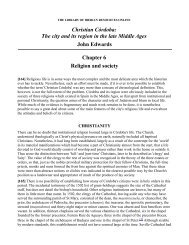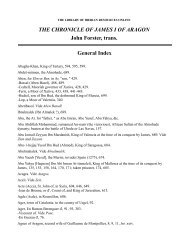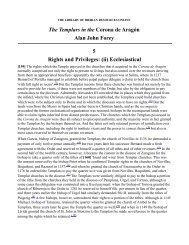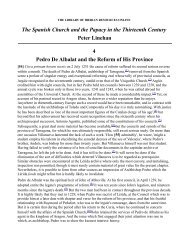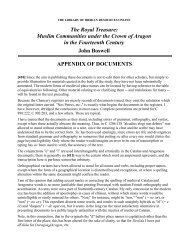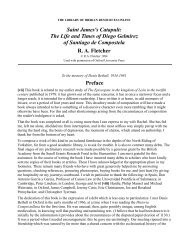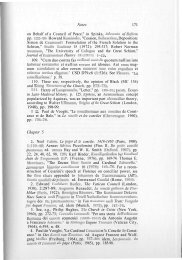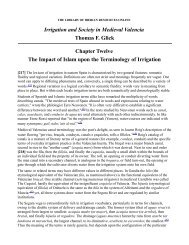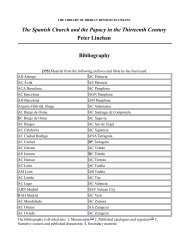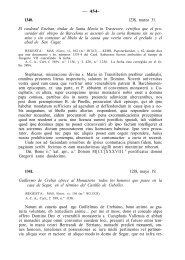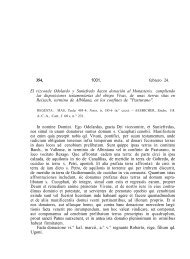PROTESTANTISM - The Library of Iberian Resources Online
PROTESTANTISM - The Library of Iberian Resources Online
PROTESTANTISM - The Library of Iberian Resources Online
Create successful ePaper yourself
Turn your PDF publications into a flip-book with our unique Google optimized e-Paper software.
satisfied with his character and habits. (75) It is evident that extraordinary precautions and universal<br />
vigilance were deemed necessary to exclude the obnoxious doctrines.<br />
Yet these efforts were rewarded with no new discoveries, for Spanish Protestantism was a mere<br />
episode, <strong>of</strong> no practical moment save as its repression fortified the Inquisition and led to the<br />
segregation <strong>of</strong> Spain from the intellectual and industrial movement <strong>of</strong> the succeeding centuries. A few<br />
sporadic cases may be noted from time to time, but the persecution <strong>of</strong> Jew and Morisco had trained the<br />
nation too thoroughly in enthusiastic fanaticism, and the organization <strong>of</strong> monarchy and Church was too<br />
absolute for [449] there to be any real danger that Protestantism could obtain a foothold. Yet the danger<br />
was deemed so pressing that extreme measures were justified to protect the land from the intrusion <strong>of</strong><br />
foreign ideas. Philip II had lost no time, after his return from Flanders, in issuing the pragmática <strong>of</strong><br />
November 22, 1559, by which all Spanish youth studying abroad were ordered home within four<br />
months, and all Spanish subjects for the future were forbidden to seek foreign lands for study under<br />
penalty, for laymen, <strong>of</strong> confiscation and perpetual exile, and for clerics, <strong>of</strong> forfeiture <strong>of</strong> temporalities<br />
and loss <strong>of</strong> citizenship. <strong>The</strong> only exceptions allowed were the college <strong>of</strong> Albornoz in Bologna and those<br />
<strong>of</strong> Rome and Naples, for Spaniards residing in Italy and that <strong>of</strong> Coimbra for the pr<strong>of</strong>essors there. (76) It<br />
would be difficult to exaggerate the unfortunate influence <strong>of</strong> this in retarding Spanish development, yet<br />
it was but the first <strong>of</strong> a series <strong>of</strong> measures which, by isolating Spain, crippled its energies in every<br />
direction.<br />
<strong>The</strong> spectre <strong>of</strong> active proselytism on the part <strong>of</strong> Protestants abroad was vigorously conjured up to<br />
stimulate vigilance and justify repression. Undoubtedly the refugees in the Rhinelands and Switzerland<br />
were earnestly desirous <strong>of</strong> evangelizing their native land, and they labored industriously to this end, but<br />
the difficulties in the way were too great and the reports as to their efforts were systematically<br />
exaggerated. Carranza, in his defence, dwelt on his exertions in Flanders to check this traffic, but<br />
though he was told <strong>of</strong> barrels full <strong>of</strong> a forged letter <strong>of</strong> Philip II and <strong>of</strong> a papal bull, at the Frankfort fair<br />
for shipment to Spain, and <strong>of</strong> shops in Medina del Campo and Málaga to which heretic books were<br />
sent, the net results <strong>of</strong> his energy show how little substratum <strong>of</strong> fact there was in all this. (77) <strong>The</strong> career<br />
<strong>of</strong> Julian Hernández proves that men who took their lives in their hands might occasionally bring in a<br />
few books, but his fate was not encouraging. If some times a missionary undertook such work his<br />
mission was apt to be brief. Hugues Bernat <strong>of</strong> Grenoble landed at Lequeitio (Biscay) August 10, 1559,<br />
on such an errand. On the road to Guadalupe he fell in with a Minim named Fray Pedro, who pretended<br />
inclination to Lutheranism and led Bernat to unbosom himself as to his plans and hopes, resulting in his<br />
speedy arrest by the tribunal <strong>of</strong> Toledo, when he boldly confessed as to himself and [450] was tortured<br />
to discover his accomplices. He was sentenced to relaxation in the auto <strong>of</strong> September 25, 1560, and as<br />
he is not described as pertinacious, he probably pr<strong>of</strong>essed conversion when, for some reason, his<br />
sentence was not executed. (78) In the trial <strong>of</strong> Gilles Tibobil (or Bonneville), at Toledo, in 1564, we hear<br />
<strong>of</strong> Francisco Borgoñon, a French haberdasher who, in his trips from France, brought with him heretic<br />
books, but they were for the benefit <strong>of</strong> a little Huguenot colony in Toledo; the number <strong>of</strong> such<br />
Frenchmen and Flemings in Spain was large and this, rather than projects <strong>of</strong> evangelization, probably<br />
explains the greater part <strong>of</strong> the smuggling, attempted or performed. (79)<br />
<strong>The</strong>re were constant rumors, however, <strong>of</strong> propagandism on a larger scale which served to magnify the<br />
importance <strong>of</strong> the Inquisition and to justify interference with commerce. In 1566, Don Francisco de<br />
Alava, a Spanish envoy to France, was busy in Montpellier endeavoring to trace the agency by which<br />
heretic books were conveyed to Catalonia, where the number <strong>of</strong> Frenchmen was large, (80) and, in the<br />
same year, Margaret <strong>of</strong> Parma, from the Netherlands, sent to Philip the absurd statement that thirty<br />
thousand <strong>of</strong> Calvin's books had been transmitted through Seville, whereupon the Suprema issued



